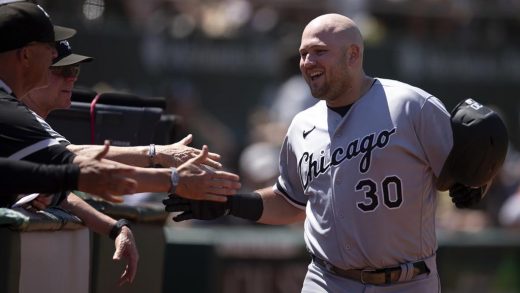
We are less than halfway through what is proving to be a glittering Commonwealth Games for New Zealand.
Kāore anō te haurua o ngā Taumāhekeheke Hoa Whenua kia pau i a tātou, heoti te āhua nei, ka pīataata a Aotearoa.
Records have fallen and tears have been shed as Kiwi athletes competing in Birmingham continue to punch above their weight on the international stage while wearing the silver fern with pride.
Kua motoa ngā puringa, kua heke a roimata, i ngā kaiaka ngāi Aotearoa e whakataetae ana ki Birmingham, me tā rātou eke tonu ki ngā taumata ā-ao, me te ponga e titi nei ki te kahu.
With six days of the competition still to go, we round up some of the best facts and figures from the Games in England.
E ono tonu ngā rangi e kainamu ana, nā reira anei ētahi o ngā meka me ngā tau paruhi i ēnei Taumāhekeheke ki Ingarangi.
26
New Zealand’s current medal haul after the first five days of competition. The 13 golds won by New Zealand so far include a record eight in the velodrome.
Te whakakaonga mētara a Aotearoa i ngā rangi tuarima kua taha ake ki te whakataetae. E tae rā anō ana ngā kōura 13 kua toa a Aotearoa ā mohoa nei ki ngā mea e waru ki te āmikumiku.
The current haul puts New Zealand in third place on the overall medal table but they are still well short of the country’s most successful Games, when they bagged 58 medals on home soil in 1990.
Nā te whakakaonga nei kua noho a Aotearoa ki te tūranga tuatoru i te ripanga mētara, engari kua kore rawa e pātata nei ki tā te whenua Taumāhekeheke tino whairawa, nō te tau 1990, toa ai rātou i ngā mētara e 58.
John Walton/AP
Ellesse Andrews wears one of the 13 gold medals won so far by New Zealand athletes in Birmingham. / E mau ana i a Ellesse Andrews tētahi o ngā mētara kōura 13 kua toa ngā kaiaka ngāi Aotearoa ā mohoa nei ki Birmingham.
63,903
The population of Bermuda – the smallest country to win a gold medal in Birmingham (triathlete Flora Duffy).
Te taupori o Bermuda – te whenua iti rawa atu kia whai i tētahi mētara kōura ki Birmingham (ko te kaiaka tauwhāinga-toru, Flora Duffy).
3
Track cycling stars Aaron Gate and Ellesse Andrews joined an exclusive club of New Zealand athletes when they picked up three gold medals at one Commonwealth Games.
I whaiwāhi atu ngā puru rourou Aaron Gate rāua ko Ellesse Andrews ki tētahi ope kaiaka motuhake ki Aotearoa, nō rāua i toa ai i ngā mētara kōura e toru ki tētahi Taumāhekeheke Hoa Whenua.
Gate, who won the individual pursuit, team pursuit and points race, and Andrews, who won the individual sprint, team sprint and keirin, are among a group of only five athletes to achieve that rare feat.
I toa a Gate i te arumanga takitahi, te arumanga takirōpū, me te arumanga piro, ā, i toa a Andrews i te terenga takitahi, te terenga takirōpū, me te hurihanga terenga (keirin), ka mutu, he tokorima kaiaka anahe kua tae ki tērā karamatamata.
Ian Walton/AP
Aaron Gate celebrates winning the men’s 40km points race ahead of team-mate Campbell Stewart. / Ko Aaron Gate e whakanui ana i te putanga o tōna ihu i te arumanga piro 40km i mua i tōna hoa a Campbell Stewart.
19
The number of Commonwealth Games medals won by Australian swimming sensation Emma McKeon, the most by an individual athlete in the history of the competition, and she’s still only 28.
Te tapeke mētara Taumāhekeheke Hoa Whenua i toa a Emma McKeon, te pūkenga kauhoe o Ahitereiria, koia tēnei te tapeke nui rawa atu o tētahi kaiaka i te katoa o ngā whakataetae o mua, ā, kua 28 anahe tōna kaumātuatanga.
McKeon’s record haul has come across three Games in Glasgow, the Gold Coast and Birmingham and includes 13 golds.
Kua toru ngā Taumāhekeheke i riro ai i a McKeon te whakakaonga mētara nei, ki Galsgow, ki te Gold Coast, ki Birmingham, ka mutu, 13 ngā kōura.
10
Kiwi triathlete Hayden Wilde was controversially denied New Zealand’s first gold medal of the Games when he was forced to serve a 10-second penalty for allegedly unclipping his helmet before he had parked his bike during the transition from the cycling to the run.
I tutū te puehu i te whakahēnga o tā Aotearoa mētara kōura tuatahi o ngā Taumāhekeheke nō tā te kaiaka tauwhāinga-toru, nō tā Hayden Wilde whai i tētahi whiunga 10 hēkona, he whakapae nō tāna wete i tōna pōtae mārō i mua i te whakatū i tōna paihikara i te whakawhitinga o te ekenga ki te omanga.
Triathlon rules state a helmet must be on the athlete’s head and secured before removing the bike from racking, and remain that way “until the bike is securely racked again”.
E ai ki ngā ture tauwhāinga-toru, me noho tonu, me ita tonu te pōtae mārō ki te upoko o te kaiaka ā mua i te tango i te paihikara i te tūnga, ā, me pērā tonu “tae noa ki te ūnga mārika anō ki te whakatūnga”.
Andrew Cornaga/Photosport
Hayden Wilde was handed a 10-second penalty that cost him a chance of gold in the men’s triathlon. / I karawhiua a Hayden Wilde e tētahi whiunga 10 hēkona, nā whai anō kāore i whaiwāhi ki te whai i te kōura ki te tauwhāinga-toru tāne.
30
Maximina Uepa’s bronze medal in the women’s 76kg final was the tiny island nation of Nauru’s 30th Commonwealth Games medal – and they’ve all have all come in weightlifting.
Ko tā Maximina Uepa mētara rauwhero ki te tātāwhāinga wāhine 76kg te mētara Taumāhekeheke Hoa Whenua 30 a te motu iti o Nauru – me te aha anō, katoa ēnei kua ahu mai i te hiki maitai.
75
The age of the oldest athlete to ever represent New Zealand, Sue Curran. 75-year-old Curran is competing in the Para B2-B3 mixed pair lawn bowls with her sighted director Brownyn Milne. Curran picked up the sport when she retired 10 years ago.
Te kaumātuatanga o te kaiaka pēperekōu rawa atu i whakakanohi i a Aotearoa, ko Sue Curran. E whakataetae ana te pēperekōu 75-tau ki te Whaikaha B2-B3 maita takirua, me tōna kaihautū whai-kitenga, a Bronwyn Milne. I aru a Curran i te hākinakina nei nōna e tāoki ana, i ngā tau 10 ki mua.
3500
White Ferns batter Suzie Bates became the first player to plunder 3500 runs in T20 internationals during her side’s 45-run win over Sri Lanka at Edgbaston.
Ko te kaipatu o te kapa Rarauhe Mā, Suzie Bates, te kaitākaro tuatahi kia eke i ngā omanga e 3500 ki ngā T20 ā-ao, i tā tōna kapa moto i a Sri Lanka me ngā omanga e 45 ki Edgbaston.
The 34-year-old struck 34 runs off 32 balls before being caught in the 12th over as New Zealand booked their spot in the semifinals of the T20 competition with a pool game to spare.
E 34 ngā omanga i patua e te wahine 34-tau i ngā pōro e 32 i mua i tāna hopunga i te ō-runga 12, i a Aotearoa e whakatūturu ana i tā rātou nōhanga ki te tātāwhāinga tuarua ki te whakataetae T20, me tētahi kēmu ā-puna e toe tonu ana.
Andrew Cornaga/Photosport
White Ferns batter Suzie Bates passed 3500 runs in T20 internationals during the win over Sri Lanka. / Ka hipa a Suzie Bates, te kaipatu Rarauhe Mā, i ngā omanga 3500 ki ngā T20 ā-ao i te patunga i a Sri Lanka.
1
The number of golds won by India in lawn bowls.
Te kōura i toa a Īnia i te maita.
The quartet of Lovely Choubey, Pinki, Nayanmoni Saikia and Rupa Rani Tirkey finally ended their long wait for glory on the greens by defeating South Africa 17-10 in a thrilling women’s fours final.
I whakamutua te tāringa roa i ngā whīra e te takiwhā o Lovely Choubey rātou ko Pinki, ko Nayanmoni Saikia ko Rupa Rani Tirkey, nō rātou i moto i a Āwherika ki te Tonga 17-10 i te tātāwhāinga mīharo o te takiwhā wāhine.
334
Andrews received a $334 fine instead of a silver medal after she was punished for missing the medal ceremony for the team pursuit.
I whāinahia a Andrews kia $334, kāore i whakawhiwhia te mētara hiriwa, ā, he whiunga i tana tamō i te whakawhiwhinga mētara nā tana noho ki te arumanga takirōpū.
Andrews had a perfectly reasonable excuse for her no-show – she was preparing for the team sprint final, which New Zealand won gold in.
I pai tā Andrews takunga mō te tamōtanga – i te whakarite kē ia mā te tātāwhāinga terenga takirōpū, me te aha anō, i toa a Aotearoa i te kōura.
6
The number of gold medals won by Australia’s men’s hockey team since the sport was introduced to the programme in Kuala Lumpur in 1998.
Te rahinga mētara kōura i toa te kapa tāne hōkī o Ahitereiria nō te kitenga o te hākinakina ki te kaupapa ki Kuala Lumpur i te 1998.
The world No 1 Kookaburras look odds on to make it seven after dismantling 2018 silver medallists New Zealand 7-2 in their pool A match.
Korekore ka whitu ki ngā Kookaburra, he moto nō rātou i ngā mētara hiriwa o 2018, a Aotearoa, 7-2 i tā rātou kēmu puna A.
Mark Kolbe/Getty Images
Aran Zalewski is mobbed by team-mates after scoring Australia’s sixth in a 7-2 rout of the Black Sticks. / Kua whakaemia te kapa e Aran Zalewski me tāna piro tuaono o te motonga 7-2 ki ngā Rākau Pango.
0.01
Zoe Hobbs, the fastest woman in New Zealand history, came within a whisker of her Oceania and national record when she clocked a scorching 11.09 seconds in the heats of the 100m to breeze into the semifinals.
Anō te tata o tā Zoe Hobbs, tō Aotearoa wāhine tere rawa atu, ki tāna puringa Te Moana Nui a Kiwa, me tāna puringa ā-motu i tāna whai i te 11.09 hēkona ki ngā whakataetae 100m e tae ngāwari atu ai ki ngā tātāwhāinga tuarua.
Hobbs lowered her personal best time to 11.08 at last month’s world championships.
I whakaheke a Hobbs i tāna terenga kino rawa atu ki te 11.08 nō te marama kua taha ake, ki ngā whakataetae ā-ao.
2
New Zealand’s 19-14 loss to Fiji in the semifinal of the men’s sevens was only their second-ever defeat at the Commonwealth Games, having won five of the previous six titles.
Ko tā Aotearoa hinganga 19-14 ki a Whīti i te tātāwhāinga tuarua o te whutupōro takiwhitu tāne, tō rātou hinganga tuarua anake ki ngā Taumāhekeheke Hoa Whenua, ā, kua toa ngā taitara e rima o ngā mea e ono o mua.
They led Fiji by 14 points at halftime but conceded three second half tries to lose the match. They then bounced back to beat Australia 26-12 in the bronze medal match.
I mua rātou i a Whīti mā ngā piro 14 i te hauruatanga, engari i whāngai i ngā tarai e toru, nā whai anō i hinga. Kātahi ka hoki mai rātou kia motoa a Ahitereiria 26-12 i te tātāwhāinga rauwhero.
David Rogers/Getty Images
The All Blacks sevens suffered only their second loss at the Commonwealth Games to Fiji in Coventry. / Ko tā te Kapa ō Pango takiwhitu hingahinga tuarua ki ngā Taumāhekeheke Hoa Whenua, i te hinganga ki a Whīti, ki Coventry.
391
The number of medals dished out in the first five days of the Games.
Te rahinga mētara kua tohaina i ngā rangi e rima kua taha ake o ngā Taumāhekeheke.
Australia lead the way on the medal table with a whopping 106 so far, including 42 golds, followed by hosts England with 86 (31 gold, 34 silver, 21 bronze).
Kei mua te ihu o Ahitereiria ki te ripanga mētara me ā rātou 106 ā mohoa nei, e tae rā anō ana ki ngā kōura e 42, kātahi ko ngā kaihautū, Ingarangi, me ngā mea 86 (e 31 ngā kōura, e 34 ngā hiriwa, e 21 ngā rauwhero).
While fourth-placed Canada have snared 20 more medals than third-ranked New Zealand, the Kiwis’ are above them by virtue of their superior gold medal count (13 to 11).
Anā, ko Kānata te tuawhā, kua 20 te rahinga ake o tā rātou whai mētara i tā te tuatoru, Aotearoa, engari kei mua tonu a ngāi Aotearoa, he maha ake nō ā rātou kōura (13 ki te 11).
Translation by Stuff Kaihautū Reo Māori Taurapa.
He whakamāoritanga nā te Kaihautū Reo Māori ki Puna, nā Taurapa.


